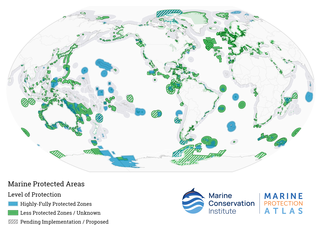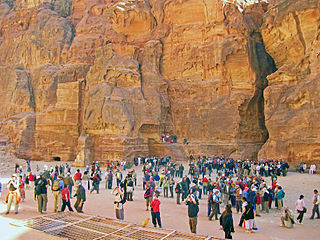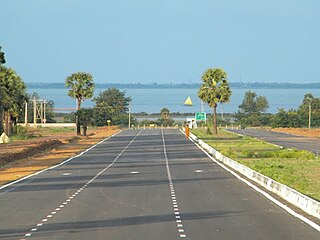
The economy of Jordan is classified as a lower middle income economy. Jordan's GDP per capita rose by 351% in the 1970s, declined 30% in the 1980s, and rose 36% in the 1990s. After King Abdullah II's accession to the throne in 1999, liberal economic policies were introduced. Jordan's economy had been growing at an annual rate of 8% between 1999 and 2008. However, growth has slowed to 2% after the Arab Spring in 2011. The substantial increase of the population, coupled with slowed economic growth and rising public debt led to a worsening of poverty and unemployment in the country. As of 2023, Jordan has a GDP of US$50.85 billion, ranking it 89th worldwide.

In urban planning, zoning is a method in which a municipality or other tier of government divides land into "zones", each of which has a set of regulations for new development that differs from other zones. Zones may be defined for a single use, they may combine several compatible activities by use, or in the case of form-based zoning, the differing regulations may govern the density, size and shape of allowed buildings whatever their use. The planning rules for each zone determine whether planning permission for a given development may be granted. Zoning may specify a variety of outright and conditional uses of land. It may indicate the size and dimensions of lots that land may be subdivided into, or the form and scale of buildings. These guidelines are set in order to guide urban growth and development.

Eilat is Israel's southernmost city, with a population of 53,151, a busy port and popular resort at the northern tip of the Red Sea, on what is known in Israel as the Gulf of Eilat and in Jordan as the Gulf of Aqaba. The city is considered a tourist destination for domestic and international tourists heading to Israel.
A free-trade zone (FTZ) is a class of special economic zone. It is a geographic area where goods may be imported, stored, handled, manufactured, or reconfigured and re-exported under specific customs regulation and generally not subject to customs duty. Free trade zones are generally organized around major seaports, international airports, and national frontiers—areas with many geographic advantages for trade.

Aqaba is the only coastal city in Jordan and the largest and most populous city on the Gulf of Aqaba. Situated in southernmost Jordan, Aqaba is the administrative center of the Aqaba Governorate. The city had a population of 148,398 in 2015 and a land area of 375 square kilometres (144.8 sq mi). Today, Aqaba plays a major role in the development of the Jordanian economy, through the vibrant trade and tourism sectors. The Port of Aqaba also serves other countries in the region.

An industrial park, also known as industrial estate or trading estate, is an area zoned and planned for the purpose of industrial development. An industrial park can be thought of as a more heavyweight version of a business park or office park, which has offices and light industry, rather than heavy industry. Industrial parks are notable for being relatively simple to build; they often feature speedily erected single-space steel sheds, occasionally in bright colours.
The National Ocean Service (NOS) is an office within the U.S. Department of Commerce, National Oceanic and Atmospheric Administration (NOAA). It is the responsible for preserving and enhancing the nation's coastal resources and ecosystems along approximately 95,000 miles (153,000 km) of shoreline, that is bordering 3,500,000 square miles (9,100,000 km2) of coastal, Great Lakes, and ocean waters. Its mission is to "provide science-based solutions through collaborative partnerships to address the evolving economic, environmental, and social pressures on our oceans and coasts." Its projects focus on working to ensure the safe and efficient marine transportation, promoting the protection of coastal communities, conserving marine and coastal places. NOS employs 1,700 scientists, natural resource managers, and specialists in many different fields. The National Ocean Service was previously also known as the National Ocean Survey until it was renamed in 1983.

Marine protected areas (MPAs) are protected areas of the world's seas, oceans, estuaries or in the US, the Great Lakes. These marine areas can come in many forms ranging from wildlife refuges to research facilities. MPAs restrict human activity for a conservation purpose, typically to protect natural or cultural resources. Such marine resources are protected by local, state, territorial, native, regional, national, or international authorities and differ substantially among and between nations. This variation includes different limitations on development, fishing practices, fishing seasons and catch limits, moorings and bans on removing or disrupting marine life. MPAs can provide economic benefits by supporting the fishing industry through the revival of fish stocks, as well as job creation and other market benefits via ecotourism. The value of MPA to mobile species is unknown.

Mixed use is a type of urban development, urban design, urban planning and/or a zoning classification that blends multiple uses, such as residential, commercial, cultural, institutional, or entertainment, into one space, where those functions are to some degree physically and functionally integrated, and that provides pedestrian connections. Mixed-use development may be applied to a single building, a block or neighborhood, or in zoning policy across an entire city or other administrative unit. These projects may be completed by a private developer, (quasi-)governmental agency, or a combination thereof. A mixed-use development may be a new construction, reuse of an existing building or brownfield site, or a combination.

The Los Roques Archipelago is a federal dependency of Venezuela consisting of approximately 350 islands, cays, and islets in a total area of 40.61 km2 (15.68 sq mi). The archipelago is located 128 km (80 mi) directly north of the port of La Guaira, in the Caribbean Sea.

Jordan is a sovereign Arab state in the Middle East. The capital, Amman, is Jordan's most populous city as well as the country's economic, political and cultural centre.

The Hawaii Department of Land and Natural Resources (DLNR) is a part of the Hawaii state government dedicated to managing, administering, and exercising control over public lands, water resources and streams, ocean waters, coastal areas, minerals, and other natural resources of the State of Hawaiʻi. The mission of the Hawaiʻi Department of Land and Natural Resources is to "enhance, protect, conserve and manage Hawaiʻi's unique and limited natural, cultural and historic resources held in public trust for current and future generations of the people of Hawaiʻi nei, and its visitors, in partnership with others from the public and private sectors." The organization oversees over 1.3 million acres of land, beaches, and coastal waters and 750 miles of coastal land.
Protected areas of Estonia are regulated by the Nature Conservation Act, which was passed by the Estonian parliament on April 21, 2004 and entered into force May 10, 2004. Overall Estonia has 15403 protected areas covering 21% of the country land and 18% of it marine and coastal territory, including 6 national parks: Lahemaa National Park, Karula National Park, Soomaa National Park,Vilsandi National Park, Matsalu National Park, and Alutaguse National Park

Sri City or Satyavedu Reserve Infracity Pvt. Ltd. is an integrated business city (township) and special economic zone located in Tirupati district in the state of Andhra Pradesh, India.
MRC Allied Inc. (MRC) is a property development firm in the Philippines. It is a publicly listed property development firm which has a position in the development of master planned, integrated residential, commercial, recreational, tourism and industrial areas within a single community or township.

Kamel Mahadin is a Jordanian architect, landscape architect, professor, author, and artist. He was the Chief Commissioner of Aqaba Special Economic Zone Authority (ASEZA) and was a Jordanian senator at The House of Senate.

The Port of Aqaba is the only port in Jordan, and is owned by Aqaba Development Corporation (ADC) and has 12 terminals operated by five operators: the Aqaba Company for port management and operation; Aqaba Container Terminal; Industrial Port Company; phosphate Company; National Electricity power Company, and the pilotage operated by Aqaba Port Marine Services Company.

Lekki is a city in Lagos State, Nigeria. It is located to the south-east of Lagos city. Lekki is a naturally formed peninsula, adjoining to its west Victoria Island and Ikoyi districts of Lagos, with the Atlantic Ocean to its south, Lagos Lagoon to the north, and Lekki Lagoon to its east; however, the city's southeast, which ends around the western edge of Refuge Island, adjoins the eastern part of Ibeju-Lekki LGA.

The Guangdong–Hong Kong–Macao Greater Bay Area, commonly as the Greater Bay Area (GBA), is a megalopolis, consisting of nine cities and two special administrative regions in South China. It is envisioned by Chinese government planners as an integrated economic area aimed at taking a leading role globally by 2035.
The marine protected areas of South Africa are in an area of coastline or ocean within the exclusive economic zone (EEZ) of the Republic of South Africa that is protected in terms of specific legislation for the benefit of the environment and the people who live in and use it. An MPA is a place where marine life can thrive under less pressure than unprotected areas. They are like underwater parks, and this healthy environment can benefit neighbouring areas.














